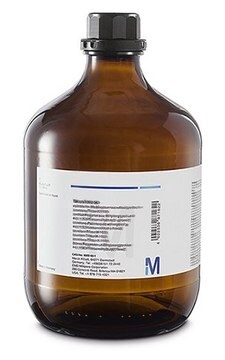21639
Octanoic acid
analytical standard
Synonym(s):
Acid C8, Caprylic acid
About This Item
Recommended Products
grade
analytical standard
Quality Level
vapor density
5 (vs air)
vapor pressure
1 mmHg ( 78 °C)
Assay
≥99.5% (GC)
shelf life
limited shelf life, expiry date on the label
technique(s)
HPLC: suitable
gas chromatography (GC): suitable
refractive index
n20/D 1.428 (lit.)
n20/D 1.428
bp
237 °C (lit.)
237-238 °C
mp
15-17 °C (lit.)
density
0.91 g/mL at 25 °C (lit.)
application(s)
cleaning products
cosmetics
flavors and fragrances
food and beverages
personal care
format
neat
functional group
carboxylic acid
shipped in
ambient
storage temp.
room temp
SMILES string
CCCCCCCC(O)=O
InChI
1S/C8H16O2/c1-2-3-4-5-6-7-8(9)10/h2-7H2,1H3,(H,9,10)
InChI key
WWZKQHOCKIZLMA-UHFFFAOYSA-N
Looking for similar products? Visit Product Comparison Guide
General description
Find all available reference materials for compounds listed in 10/2011 here
Application
Recommended products
Signal Word
Danger
Hazard Statements
Precautionary Statements
Hazard Classifications
Aquatic Chronic 3 - Eye Dam. 1 - Skin Corr. 1C
Storage Class Code
8A - Combustible corrosive hazardous materials
WGK
WGK 1
Flash Point(F)
>230.0 °F - closed cup
Flash Point(C)
> 110 °C - closed cup
Personal Protective Equipment
Regulatory Listings
Regulatory Listings are mainly provided for chemical products. Only limited information can be provided here for non-chemical products. No entry means none of the components are listed. It is the user’s obligation to ensure the safe and legal use of the product.
FSL
Group 4: Flammable liquids
Type 3 petroleums
Hazardous rank III
Water insoluble liquid
JAN Code
21639-VAR:
21639-5ML:
21639-BULK:
Choose from one of the most recent versions:
Already Own This Product?
Find documentation for the products that you have recently purchased in the Document Library.
Customers Also Viewed
Our team of scientists has experience in all areas of research including Life Science, Material Science, Chemical Synthesis, Chromatography, Analytical and many others.
Contact Technical Service









